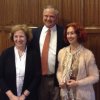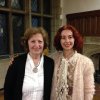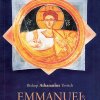Kolo Srpskih Sestara hosted everyone who could stay after the Divine Liturgy on March 8th and spend their lunch time at the social hall of the Holy Trinity Church. Kolo members provided a very healthy vegan meal, including home baked desserts. Reverend Rajko Kosic and his wife Vera also publicized and attended both events. Milina Jovanovic was introduced by Krinka Vidakovic Petrov and Milos Rastovic of the Serb National Federation. She talked about her book From the Balkans to the Pacific Coast and Serbian history in California, emphasizing connections between various Serbian communities across the U. S. This was an informal presentation and the audience enjoyed talking to both authors. Ms. Vidakovic Petrov is well known among the parishioners and they also showed a lot of interest in Ms. Jovanovic's research. The question and answer segment of the event was even more informal. The audience had an opportunity to be active participants sharing their own stories and constructive comments. At the end of the event, the two authors and Kolo members noted that this was a great way to celebrate March 8th, the International Women's Day. Ms. Jovanovic talked about the notable Serbian women of Amador County who remain impressive with their strength, creativity, generosity and bravery.
One day later, on March 9th, Krinka Vidakovic Petrov and Milina Jovanovic gave a talk at Pittsburgh University. This event was sponsored by the Serb National Federation--the publisher of American Srbobran, the oldest existing Serbian printed media. Organizers chose one of the most impressive academic settings as a venue - the famous Cathedral of Learning. Based on their perception that the Yugoslav Room was too small for the number of attendees. the event was held in the English Room. Pittsburgh University is unique with its Nationality Rooms built over time to teach students that they need to broaden their geographical and cultural understanding of distant countries. These rooms are still used as classrooms, but they are also one of the many great tourist attractions in the city of Pittsburgh. In the evening of March 9th the audience had a chance to learn more details about how All Roads Lead to Jackson developed from a vague idea to a lengthy research project, to the publication of a book. Ms. Jovanovic also explained why Serbian history in the U. S. in many ways started on the West Coast, precisely in California, and remains deeply rooted in Jackson. Ca. All questions about the book title, research methodology, and community image were answered at the end of the event. Ms. Vidakovic Petrov talked about the Serbian history on the East Coast where the first individuals arrived from Serbian lands. However, those individuals were not able to form stable communities. The first sustainable communities, Serbian organizations, Serbian Orthodox Church, and printed media, originated in California. Dr. Vidakovic highlighted stories of several exceptional individuals and mentioned George Fisher who was the first Secretary of California’s Land Commission in 1953 and a famous physicist and the first Serbian Consul General in New York, Mihailo Pupin. Some of those lesser known individuals volunteered to fight in the Great War and stayed in the old country afterwards. Others returned to the U. S. to pursue different kinds of endeavors. Some of their stories are included in Vidakovic Petrov’s book Serbian Americans and Their Printed Media.After the event, Mr. John Martich, the President of the Serb National Federation and Milos Rastovic of the same organization, invited all attendees to continue their lively conversations with the two authors and share refreshments provided by the Federation. Many stayed for anadditional hour and socialized with each other, Ms. Jovanovic and Ms. Vidakovic Petrov. It should be noted that Krinka Vidakovic Petrov is a distinguished expert on Serbian American history. She published several books and numerous scholarly articles on this topic in Belgrade, her primary residence. Her book Serbian Americans and Their Printed Media was recently translated by Milina Jovanovic and the English version is forthcoming by Sebastian Press.







